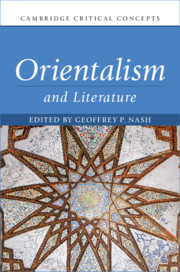Book contents
- Orientalism and Literature
- Cambridge Critical Concepts
- Orientalism and Literature
- Copyright page
- Contents
- Contributors
- Acknowledgments
- Introduction
- Part 1 Origins
- Part II Development
- Part III Application
- Chapter 14 From Orientalism to Islamophobia
- Chapter 15 Applications of Neo-Orientalism and Islamophobia in Recent Writing
- Chapter 16 Orientalism and Cultural Translation: Middle Eastern American Writing
- Chapter 17 New Orientalism and the American Media: New York Cleopatra and Saudi “Giggly Black Ghosts”
- Chapter 18 On Orientalism’s Future(s)
- Chapter 19 “The Engine of Survival”: A Future For Orientalism
- Further Reading
- Index
Chapter 16 - Orientalism and Cultural Translation: Middle Eastern American Writing
from Part III - Application
Published online by Cambridge University Press: 01 November 2019
- Orientalism and Literature
- Cambridge Critical Concepts
- Orientalism and Literature
- Copyright page
- Contents
- Contributors
- Acknowledgments
- Introduction
- Part 1 Origins
- Part II Development
- Part III Application
- Chapter 14 From Orientalism to Islamophobia
- Chapter 15 Applications of Neo-Orientalism and Islamophobia in Recent Writing
- Chapter 16 Orientalism and Cultural Translation: Middle Eastern American Writing
- Chapter 17 New Orientalism and the American Media: New York Cleopatra and Saudi “Giggly Black Ghosts”
- Chapter 18 On Orientalism’s Future(s)
- Chapter 19 “The Engine of Survival”: A Future For Orientalism
- Further Reading
- Index
Summary
The effects of Edward Said’s analysis of the West’s myopic representations of the East in his seminal work Orientalism (1978) has had long-lasting reverberations on Easterners themselves, particularly in the ways they respond to such Orientalist depictions and rearticulate themselves in the process. Given the centrality of literary studies to Said’s project of delineating and analyzing Orientalist thought, this chapter explores the ways in which literary narratives written by Middle Eastern American writers navigate stereotypes about Easterners circulated through Orientalist discourse. Rather than engaging with Orientalism as a static or unchanging discourse, however, such literary narratives address what can be described as the evolution of colonial Orientalist discourse into Neo-Orientalist representations of Easterners (particularly here Arabs and Muslims), especially as shaped by twentieth- and twenty-first-century imperial and militaristic US projects in the Middle East, starting with the post–Cold War period up until the present so-called US-led War on Terror.
- Type
- Chapter
- Information
- Orientalism and Literature , pp. 286 - 305Publisher: Cambridge University PressPrint publication year: 2019



